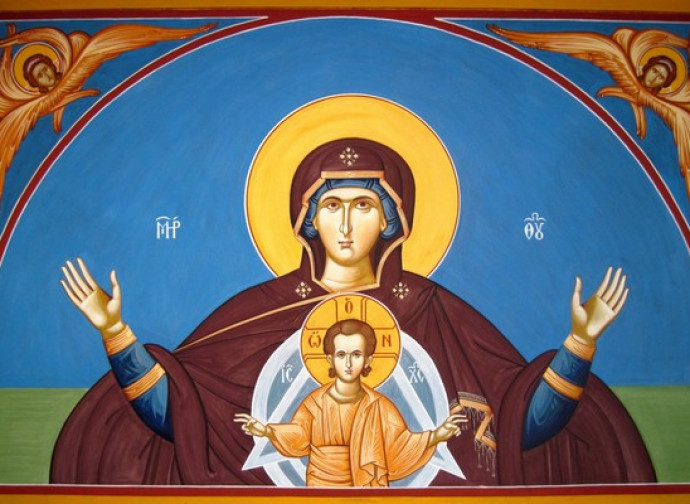Mary's divine Motherhood that gives way to redemption
When we think of the mother of God we tend to "shift" to our level of experience, reducing Mary to a carnal mother. Instead, the Church teaches that it is precisely by our asserting her title of Dei Genetrix that we can defend the truth of the two natures of the One Divine Person. Moreover, Mary's "yes" to the Incarnation includes her "yes" to participate in the redemptive work of her Son. That is why she is Co-Redeemer and not merely a most virtuous woman.

We have become so accustomed to the Mary’s title of Theotokos, Mother of God (more literally, "Parent of God", as expressed in the Latin terms Deipara or Dei Genetrix) that we no longer feel emotion and wonder. When we think of Mary as the Mother of God we tend to "shift" toward our level of experience, thereby reducing her as the carnal mother of the Child Jesus and nothing more than this.
Recognizing Mary as Deipara, on the other hand, fully contrasts to this reductionism: this is not to deny the natural level of her motherhood, but to indicate that this level gives rise to another higher and much grander one. To safeguard her divine majesty and transcendence, to those who wanting to diminish the glory of the Mother of God, the Church responded once and for all that in recognising the extraordinary greatness of being the Mother of God, being elevated above all creatures, we defend the mystery of God. It was not by denying, but by affirming her title of Theotokos, that we may defend the truth of the two natures in the One Divine Person of the Word Incarnate.
The distinguished dignity of divine Motherhood is a dogma we should find astonishing: Mary, in fact, through this motherhood enters into a unique relationship with the Word of God made flesh, with the divine and uncreated Person of the Incarnate Word. Mary is not, indeed, the Mother of simply the human nature of Christ, but also of the One Divine Person who assumed that human nature. Here we touch upon a very important point: if it is true, as it is, that divine Motherhood is in relation to the "whole" of Christ, in His Divine Personhood, the Divine Motherhood is of a hypostatic order. As Cardinal Gaetano used to say: "she arrives at the boundaries of divinity." This does not mean that Mary has a hypostatic union with God - which would be a serious heresy - but that she has been predestined to a greater elevation than that of grace, glory, and even nature.
Mary's fullness of grace, her Immaculate Conception, and her perpetual virginity are the privileges that form the crown of her ultimate elevation to the hypostatic order. In the Papal Bull Ineffabilis Deus, which proclaimed the dogma of the Immaculate Conception, Blessed Pius IX wrote precisely: "From the very beginning, and before time began, the eternal Father chose and prepared for His only-begotten Son a Mother in whom the Son of God would become incarnate and from whom, in the blessed fullness of time, He would be born into this world. Above all creatures did God so love her that truly in her was the Father well pleased with singular delight. Therefore, far above all the angels and all the saints so wondrously did God endow her with the abundance of all heavenly gifts poured from the treasury of His divinity that this mother, ever absolutely free of all stain of sin, all fair and perfect, would possess that fullness of holy innocence and sanctity than which, under God, one cannot even imagine anything greater, and which, outside of God, no mind can succeed in comprehending fully."
Therefore, if on the one hand the great Marian privileges depend on her divine Motherhood, on the other hand, the latter opens in her heart to the single and unique participation of Mary in the work of Redemption.
Mary's fiat, given at the Incarnation of the Word and, thus, at the beginning of our Redemption, included her "yes" to participating in the redemptive work of her Son. It is a yes renewed at every moment of her life and culminates at the foot of the Cross. In the same way, her Son, upon entering the world, pronounced his "here I am", repeated all the way to his self-sacrifice on Calvary.
Therefore, if Mary's divine Motherhood means entering the hypostatic order, an order which is in a way infinite and second only to the true and proper hypostatic Union (an order that immeasurably transcends the orders of nature, grace and glory), then her participation in the redemptive work of her Son cannot but be conceived in the same order. Moreover, if divine ordinances have deemed divine Motherhood as necessary for the Incarnation of the Son, why then should we be surprised if the same decrees make it necessary for Mary to be the Co-Redeemer in the work of Redemption?
The mystery of the Mother of God can never be adequately understood by the human race. The most adequate understanding is the one that comes closest to the indescribable truth: as finite tending to infinity. Analogously, the most inadequate understanding is that which would deny the super-eminent elevation of the Virgin Mary of Nazareth, reducing her to a most virtuous but "everyday woman." It would mean insisting on her virtues to the point of silencing or even rejecting her uniqueness in the plan of the Incarnation and Redemption.
The Mother of God dogma, which is less poorly understood, leads believers who contemplate it to be enlightened by their faith and to honour Mary, the Mother of the Word of God, with the title of Co-Redeemer. On this Solemnity, let us pray to the Ever-Virgin Mary that she may dispel the haze from our eyes and deign to reveal herself soon for who she is: the Co-Redeemer of mankind.
